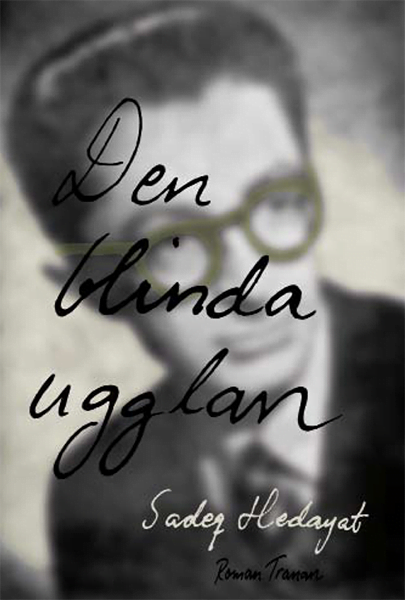Sadeq Hedayat’s Den blinda ugglan (The Blind Owl, or Boof-e Kur in Persian) came to my attention through a member of my monthly philosophy reading group. Not because it had anything to do with philosophy, but because we were chatting about Swedish book clubs. I’d never heard of the book or the author before, and the description sounded intriguing:
The Blind Owl is described as a text without peer, with influences from Kafka and Poe as well as from Persian mythology and folk tales. A man recounts his life history to his own shadow. The confusion of losing his mystical lover has driven him to the edge of death or madness. Time and space have disintegrated and the same motifs, the same people constantly reappear in new forms.
The book can be read as a horror story, a surreal depiction of a nightmare or perhaps as an opium-laced game with distorted reflections. André Breton called the book one of the few true masterpieces.
The most frustrating thing for me now is finding out after the fact that it’s full of references to Persian mythology. That’s a huge field to dive into just for the sake of a short book, and yet without that knowledge it feels like the story loses a lot of its impact.
At the end of the day, I’m not sure what I read, but it cracked my idea of what a novel can be wide open. What we have, nominally, are the journalistic confessions of an ailing, unnamed narrator addressed to the shadows on his wall. Is he dying? Is he depressed? Both? Something else? In the first portion of the novella (no chapter breaks, only a handful of section breaks) he mourns the death of an otherworldly woman with whom he feels mystically connected. In the second we get distorted glimpses of a slightly less surreal life, with a domineering (though affectionate) mother-in-law and a promiscuous wife who withholds sex from the narrator. Are they the same people? Is this the same tale told twice, or is one just the opium-induced hallucination of the other? Is any of this even happening at all? Another review compared it to Steppenwolf but for my money, Den blinda ugglan is much, much weirder.
I happened to watch Mulholland Drive while I was reading this, so maybe that’s why the comparison is ready at hand for me to make, but the even so the two are similar. Putting aside the shared surface-level surrealism, they’re both bifurcated, with two distinct narratives that might or might not be connected, presented by two unreliable narrators who might or might not be the same person. Events in both parts are paradoxical or explicitly contradictory, though they are united by the names and images and phrases that recur in both parts. Romantic jealousy is also a key part of the narrative, whether literal or as a metaphor for a more spiritual struggle.
There’s my nutshell summary, I guess: What if Mulholland Drive were a novella written by an Iranian author living in Paris during the 1930s?


One thought on “Den blinda ugglan”